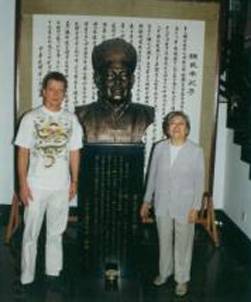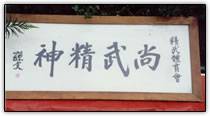 When Master Huo died, he was immediately deified by his disciples. He was irreplaceable as a master but his prestige and ideal could still be useful after his death. Deprived of its leader, the school suffered some financial and administrative problems, as well as some hesitation. However, after moving out and a more dynamic new administration, the Jingwu Men had a fresh start under Master Huo's best disciples such as Liu Zheng-sheng, Zhao Lianhe and Master Huo's own son, Huo Dongge. As soon as 1918, the Jingwu school had already opened several branches in at least half a dozen of cities across China such as Wuhan, Guangzhou and Foshan. In 1919, when the association celebrated its tenth anniversary, it had the immense honour to receive from the great revolutionary Sun Yat-sen a big commemorative tablet on which was written: ‘Gave great importance to the values promoted by martial arts'. When Master Huo died, he was immediately deified by his disciples. He was irreplaceable as a master but his prestige and ideal could still be useful after his death. Deprived of its leader, the school suffered some financial and administrative problems, as well as some hesitation. However, after moving out and a more dynamic new administration, the Jingwu Men had a fresh start under Master Huo's best disciples such as Liu Zheng-sheng, Zhao Lianhe and Master Huo's own son, Huo Dongge. As soon as 1918, the Jingwu school had already opened several branches in at least half a dozen of cities across China such as Wuhan, Guangzhou and Foshan. In 1919, when the association celebrated its tenth anniversary, it had the immense honour to receive from the great revolutionary Sun Yat-sen a big commemorative tablet on which was written: ‘Gave great importance to the values promoted by martial arts'.
After the fall of the Qin dynasty and the setting up of the Republic, China went through a prolonged period of troubles, instability, foreign invasions and civil war which greatly disturbed the institutional development of martial arts schools. Yet, it didn't prevent the Jingwu from having during the 1940s more than 42 open branches. The communists' coming to power did turn out as a hard blow since they wished to run themselves the teaching and practice of martial arts in China, the Communist Party obliged all the masters and schools in China to subdue to a strict control by the State. Nevertheless, at that time, the Jingwu had since long opened branches in South-East Asia , Malaysia , Singapore and Hong Kong notably and the Jingwu association, by following the Chinese diaspora, was able to extend itself all over the world especially in the USA and Europe . The 80s and 90s were the decades when the numerous Jingwu schools throughout the world tried to get organised into a unified international movement.

|
